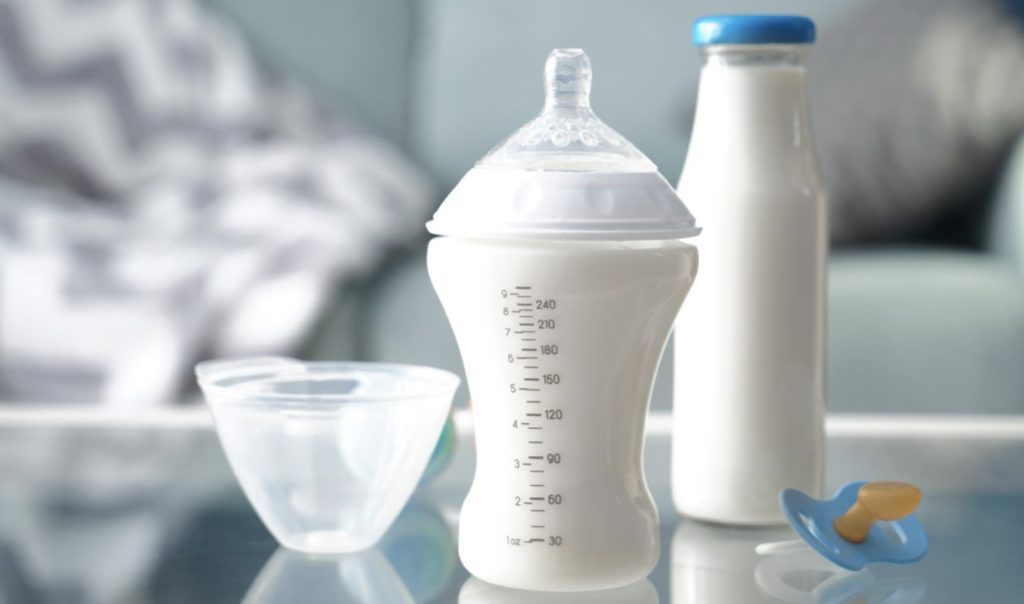Infants who need mixed and artificial feeding should only receive adapted milk formula for proper development. When choosing a baby formula it is necessary to take into account the age of the child, the gastrointestinal tract, the risk of allergies, and diseases, the nature and possible side effects of taking medication, the financial level of the family, the individual tolerance of this particular mixture and the child’s tastes.
From the first weeks of life of the child preference should be given to unleavened milk formulas, and then, if necessary, a combination of unleavened and fermented milk formulas.
What a good formula must contain
Mother’s milk substitutes (formula) should be as close (adapted) in composition as a woman’s breast milk. Breastmilk substitutes are often made from cow’s or goat’s milk. In the manufacture of baby food carried out an approximation of the composition of milk formulas to the composition of breast milk in all components – protein, carbohydrate, fat, vitamins, and minerals. Such formulas are called adapted, as indicated on the packaging. Lebenswert formula has a balanced composition, a high level of adaptation, and excellent reviews from parents.
An important component of mixtures is linoleic and linolenic acids: their ratio in a woman’s milk is 5:1. In adapted formulas this ratio is slightly different: 7:1 to avoid pathologies related to the cardiovascular, nervous, and immune systems.
Taurine is an important amino acid that promotes better absorption of fats and relieves cramps. A taurine deficiency can cause problems with vision, heart, gastrointestinal, kidney, liver, and nervous system.
Lactose, starch, or maltodextrin (partially broken down starch) are the main carbohydrates that can be found in blends. Carbohydrates promote proper intestinal peristalsis, provide a feeling of fullness and reduce regurgitation.
Manufacturers of modern formulas are trying to add prebiotics to their products, such as oligosaccharides, dietary fiber, inulin, and lactulose. These substances help to avoid constipation, making stools softer.
Specialists believe that infant formulae should contain calcium and phosphorus in the ratio of 2:1, potassium and sodium in the ratio of 3:1, iron and zinc in the ratio of 2:1, and iron and copper in the ratio of 20:1.
As for manganese, it is usually about 0.7 mcg in the composition of women’s milk. That is why it is necessary to choose mixtures with the same content because an excess of magnesium can lead to concentration problems in a child. The Jovie formula takes all these proportions into account.
Usually, the formula is 15% more vitaminized than breast milk because the baby absorbs vitamins less well when fed artificially than when breastfed.
The main vitamins in the mixes are L-carnitine (1-1.5 mg per 100 ml for growth and weight gain, immune and nervous system formation, and fatty acid synthesis), ascorbic acid (5-10 mg per 100 ml for better iron absorption), inositol, B8 (promotes nervous system development), choline (for brain development), lutein (for visual system formation).
Nucleotides are necessary for the baby’s body to form normally the mucous membranes of the gastrointestinal tract and its immune system.
How do you know if a baby is malnourished?
If the baby does not put on weight well or against a background of complete well-being, without contact with sick children, shows signs of digestive problems (belching, liquid stools or constipation; inability to empty himself; colic, bloating, increased gasping; allergic skin rashes; from food) this may indicate the formula. Also, if after canceling the formula or switching to another formula the baby’s condition normalizes, it means that the formula was the problem.
If parents see any dangerous symptoms, they should go to the doctor immediately and not hesitate to do so, since repeated diarrhea or vomiting can lead to dehydration and dangerous consequences. If the baby is no longer suitable for the formula, it should only be discontinued and replaced with another formula after medical advice.
How do I switch my baby to another formula?
Sometimes situations arise when switching to a different formula becomes a must. These signs will help you know that the type of formula chosen is not suitable for your baby:
- Allergies begin to appear. The main sign of food allergies is a rash and redness on the skin.
- Unstable functioning of the digestive system. Constipation, flatulence, or diarrhea may occur because of improper nutrition.
- Lactase deficiency. This is a disorder in which milk protein stops being broken down. The deficiency can be congenital or acquired, and a switch to a special lactose-free formula is necessary to correct it.
- Age-related changes. As your baby gets older, you need to introduce a more nutritious formula into the diet. If you notice the first signs of allergies or other disorders in your baby, be sure to see your pediatrician. You will only be able to reach a conclusion about the cause of your concern and what formula should be introduced after you have had tests done.
Always be aware of your baby’s individuality. It can be difficult for parents to find the milk formula that is ideal for their baby the first time. Seek advice from your pediatrician, who can assess your baby’s health and help you make the right choice.


